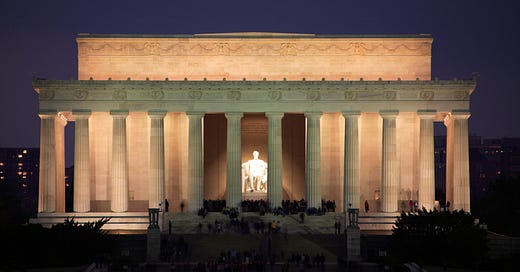Living & Dead: Lincoln’s Gettysburg Address
In an age of postmodern progressive vulgarity, the poetry and philosophic statesmanship of the Gettysburg Address expands the soul and reminds us to look up to see what is high, true, and good.
Note: Several weeks ago, I published an essay about Halloween, explaining the origins of that unusual holiday and the long tradition of honoring the dead. That same tradition frames the most famous political speech in history: Lincoln’s Gettysburg Address. The piece below ties together many of my favorite subjects of study. I hope you enjoy reading it because I enjoyed writing it.
—Thomas L. Krannawitter, Ph.D.
Proprietor of Zetetic Questions
Abraham Lincoln's Gettysburg Address is renowned worldwide. Even people in distant, remote lands who might know little about the United States are likely familiar with Abraham Lincoln and his Gettysburg Address.
Lincoln’s speech—engraven on the South Wall of the Lincoln Memorial in Washington D.C.—rightly invites comparison with the most famous eulogy of classical antiquity: the funeral oration delivered by the Athenian statesman Pericles in 431 BC for fallen Athenian soldiers, as recorded in Thucydides’ History of the Peloponnesian War.
The speech delivered by the American Abraham in 1863, however, surpasses the oration of the famous Greek in almost every way—except length. In just 272 words, Lincoln achieved what no one—Pericles included—had ever done before or has done since.
I humbly suggest that the Gettysburg Address is a work of rhetorical perfection. It cannot be improved or edited in any way.
Context
Lincoln’s brief speech was part of a dedication ceremony at Gettysburg Cemetery on November 19, 1863, following one of the Civil War’s pivotal conflicts: the Battle of Gettysburg.
Here is an audio version of this essay.
From July 1 to July 3, 1863, the Battle of Gettysburg shook the rolling hills and picturesque farmland of southern Pennsylvania, resulting in a Union victory that halted the Confederate invasion of the North. It was one of the bloodiest battles of the war, with over 51,000 soldiers killed, wounded, or missing.
To put this in perspective: more men died in three days at Gettysburg than all the U.S. soldiers killed during the siege of Iwo Jima, which lasted over a month.
In the aftermath of the battle, there was a pressing need to reinter the remains of fallen soldiers, many of whom lay in hastily dug, shallow graves across the battlefield. The Gettysburg National Cemetery was established to provide a formal burial place for Union soldiers.
The dedication ceremony aimed to consecrate the cemetery and honor those who had died during the Battle of Gettysburg.

The keynote speaker at the ceremony was Edward Everett, a former governor of Massachusetts, U.S. senator, Harvard professor and president, and renowned orator. He delivered a two-hour speech that virtually no one remembers today.
Almost as an afterthought, the organizing committee decided at the last minute to invite President Abraham Lincoln to deliver some “brief remarks” during the ceremony. Those remarks are now remembered worldwide as the Gettysburg Address.
Ancient and Sacred
The tradition of dedicating cemeteries—the most sacred and holy ground in most cities—dates back to antiquity.
The solemnity surrounding these burial grounds stemmed from the belief, held by most people throughout history, that the gods who protected them, guided them, and occasionally blessed them with victory in war and other gifts, were the spirits of their ancestors—the founding fathers who first established laws for the tribe or clan.
(See The Ancient City by Fustel de Coulanges, originally published in 1864.)
For most ancient peoples, the treatment of the dead was a matter of utmost importance—literally of life and death. Burial grounds were sacred because they connected the living with the dead—a bridge between worlds—to be honored, feared, and tread upon with the greatest respect and reverence.





